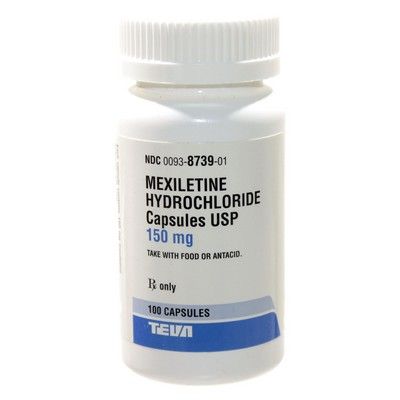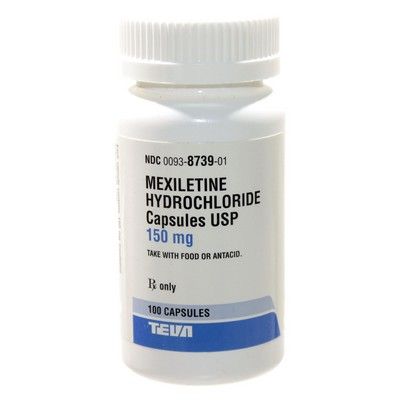Providing Quality & Trust || Clinic Website
Detailed Description
Mexiletine
(mex-ill-eh-teen)
- Description: Agent to Treat Irregular Heartbeats
- Other Names for this Medication: Mexitil®
- Common Dosage Forms: Veterinary: None.
Key Information:
- Needs to be given 3 times a day.
- Give this medicine with food to reduce the risk of vomiting or nausea (acting sick).
- Vomiting is the most likely side effect; contact your veterinarian if it continues.
Mexiletine is a drug used to treat irregular heart rhythms in dogs and cats. Mexiletine has also been used to treat some muscle conditions seen in some dog breeds (eg, chow chows, miniature schnauzers, Jack Russell terriers).
- The FDA has approved this drug for use in humans but it is not officially approved for use in animals.
- The FDA allows veterinarians to prescribe products containing this drug in different species or for other conditions in certain situations.
You and your veterinarian can discuss why this drug is the most appropriate choice.
Uses/Indications:
Mexiletine may be useful to treat some ventricular arrhythmias, including PVCs and ventricular tachycardia in dogs. Ventricular tachycardias that have responded to lidocaine may respond to mexiletine. Limited, controlled or retrospective studies have shown some evidence for efficacy for certain dogs (boxers, German shepherds),but the drug’s low therapeutic index, availability, expense, and dosing frequency are all problematic.
Mexiletine may be useful treating certain myopathies in dogs such as myotonia congenita (most studied in miniature schnauzers and Chow Chows) and myokymia in Jack Russell terriers.
Side effects that usually are not serious include:
- Vomiting, stomach discomfort(acting “sick”), diarrhea, or constipation. Dizziness, clumsiness, anxiety/nervousness, or tremors.
You don’t have to be overly concerned if you see any of these signs unless they are severe, worsen, or continue to be a problem.
Contact your veterinarian if this happens.
Adverse Effects:
The most likely adverse effect noted in animals is GI distress, including vomiting. Giving with meals may alleviate GI effects. Potentially (reported in humans): CNS effects (trembling, unsteadiness, dizziness, depression), shortness of breath, PVCs and chest pain could occur. Rarely, seizures, agranulocytosis, and thrombocytopenia have been reported in humans.
Precautions/Warnings:
Mexiletine should be used with extreme caution, if at all, in patients with pre-existing 2nd or 3rd degree AV block (without pacemaker), or with cardiogenic shock. It should be used only when the benefits of therapy outweigh the risks when the following medical conditions exist: severe congestive heart failure or acute myocardial infarction, hepatic function impairment, hypotension, intraventricular conduction abnormalities, sinus node function impairment, seizure disorder, or sensitivity to the drug.
Dogs that are homozygous for the MDR1 gene defect may be susceptible to mexiletine toxicity. It is recommended to test before using in susceptible breeds.
It is anecdotally reported that cats are more sensitive than dogs to mexiletine’s adverse effects.
If you have any other questions about this medication, contact your veterinarian or pharmacist.
Powered by nopCommerce
This site is running in live payment mode. Real payments will be processed.

